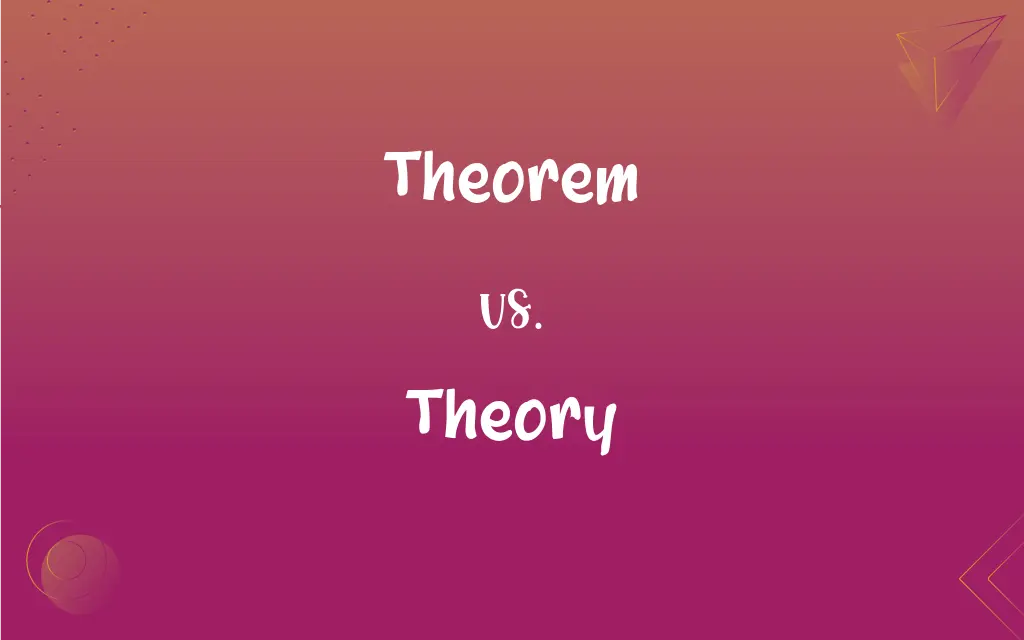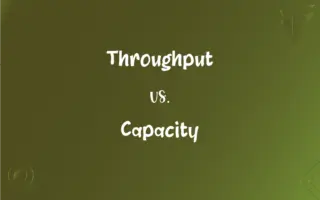Theorem vs. Theory: What's the Difference?
Edited by Aimie Carlson || By Janet White || Updated on October 19, 2023
A "Theorem" is a mathematical statement proven based on previously established statements; a "Theory" is a proposed explanation for phenomena, grounded in evidence.

Key Differences
"Theorem" in mathematics refers to a proposition that has been or is to be proven on the basis of explicit assumptions. It's a statement that is demonstrated to be true within the context of a formal logical system. In contrast, "Theory" refers to a conceptual framework that explains existing observations and predicts new empirical data. It's a scientifically acceptable general principle offered to explain phenomena.
A "Theorem" typically follows from a set of premises or axioms, and its validity is intrinsic to the logical structure of its formulation. "Theory," however, is a result of hypothesis testing and refinement, and its validity comes from its ability to explain and predict real-world phenomena.
While a "Theorem" is characterized by its rigorous proof, leaving no room for doubt when correctly applied, a "Theory," although supported by substantial evidence, is always subject to further testing and potential falsification through new evidence.
In the application, a "Theorem" is used as a foundational element in more complex mathematical or logical deductions. Conversely, a "Theory" serves as a guide in scientific inquiries, setting the stage for ongoing research and exploration, often driving the direction of new studies.
Despite their differences, both "Theorem" and "Theory" contribute to human knowledge: theorems offering certainty within mathematics, and theories providing evolving explanations about our complex universe.
ADVERTISEMENT
Comparison Chart
Nature
Conclusive statement
Explanatory framework
Validation
Logical proof
Empirical evidence
Application
Mathematical deduction
Scientific research
Flexibility
Static (within its system)
Evolving
Purpose
Establish mathematical truths
Explain and predict phenomena
ADVERTISEMENT
Theorem and Theory Definitions
Theorem
A formula, proposition, or statement in mathematics or logic deduced or to be deduced from other formulas or propositions.
The student proved the theorem with impeccable logic.
Theory
A supposition or a system of ideas intended to explain something, especially based on general principles independent of the thing to be explained.
Darwin's theory of evolution caused much debate.
Theorem
An idea accepted or proposed as a demonstrable truth, often as part of a general theory.
The theorem stood unchallenged for years.
Theory
An idea used to account for a situation or justify a course of action.
My theory on the crime turned out to be correct.
Theorem
A general proposition not self-evident but proved by a chain of reasoning.
The theorem was so complex that only a few could understand it.
Theory
A hypothesis that has been confirmed or established by observation or experiment.
The theory was supported by the latest research.
Theorem
An idea that has been demonstrated as true or is assumed to be so demonstrable.
Theory
A general statement or set of statements about a group of phenomena that has substantial evidence or that has been the subject of many successful scientific experiments.
The theory of relativity changed how we understand space and time.
Theorem
(Mathematics) A proposition that has been or is to be proved on the basis of explicit assumptions.
Theory
A set of principles on which the practice of an activity is based.
I read a book on music theory.
Theorem
(mathematics) A mathematical statement of some importance that has been proven to be true. Minor theorems are often called propositions. Theorems which are not very interesting in themselves but are an essential part of a bigger theorem's proof are called lemmas.
Theory
A set of statements or principles devised to explain a group of facts or phenomena, especially one that has been repeatedly tested or is widely accepted and can be used to make predictions about natural phenomena.
Theorem
A mathematical statement that is expected to be true
Fermat's Last Theorem'' was known thus long before it was proved in the 1990s.
Theory
The branch of a science or art consisting of its explanatory statements, accepted principles, and methods of analysis, as opposed to practice
A fine musician who had never studied theory.
Theorem
(logic) A syntactically correct expression that is deducible from the given axioms of a deductive system.
Theory
A set of theorems that constitute a systematic view of a branch of mathematics.
Theorem
(transitive) To formulate into a theorem.
Theory
Abstract reasoning; speculation
A decision based on experience rather than theory.
Theorem
That which is considered and established as a principle; hence, sometimes, a rule.
Not theories, but theorems ( ), the intelligible products of contemplation, intellectual objects in the mind, and of and for the mind exclusively.
By the theorems,Which your polite and terser gallants practice,I re-refine the court, and civilizeTheir barbarous natures.
Theory
A belief or principle that guides action or assists comprehension or judgment
Staked out the house on the theory that criminals usually return to the scene of the crime.
Theorem
A statement of a principle to be demonstrated.
Theory
An assumption based on limited information or knowledge; a conjecture.
Theorem
To formulate into a theorem.
Theory
A description of an event or system that is considered to be accurate.
Theorem
A proposition deducible from basic postulates
Theory
(sciences) A coherent statement or set of ideas that explains observed facts or phenomena and correctly predicts new facts or phenomena not previously observed, or which sets out the laws and principles of something known or observed; a hypothesis confirmed by observation, experiment etc.
Theorem
An idea accepted as a demonstrable truth
Theory
(uncountable) The underlying principles or methods of a given technical skill, art etc., as opposed to its practice.
Theorem
A statement that has been proven on the basis of previously established statements.
Pythagoras' theorem is fundamental in geometry.
Theory
(mathematics) A field of study attempting to exhaustively describe a particular class of constructs.
Knot theory classifies the mappings of a circle into 3-space.
Theorem
A rule in mathematics or logic that is necessarily true on the basis of a given set of conditions.
Using the theorem, they solved the equation efficiently.
Theory
A hypothesis or conjecture.
Theory
A set of axioms together with all statements derivable from them; or, a set of statements which are deductively closed. Equivalently, a formal language plus a set of axioms (from which can then be derived theorems). The statements may be required to all be bound (i.e., to have no free variables).
A theory is consistent if it has a model.
Theory
A doctrine, or scheme of things, which terminates in speculation or contemplation, without a view to practice; hypothesis; speculation.
Theory
An exposition of the general or abstract principles of any science; as, the theory of music.
Theory
The science, as distinguished from the art; as, the theory and practice of medicine.
Theory
The philosophical explanation of phenomena, either physical or moral; as, Lavoisier's theory of combustion; Adam Smith's theory of moral sentiments.
Theory
A well-substantiated explanation of some aspect of the natural world; an organized system of accepted knowledge that applies in a variety of circumstances to explain a specific set of phenomena;
Theories can incorporate facts and laws and tested hypotheses
True in fact and theory
Theory
A tentative theory about the natural world; a concept that is not yet verified but that if true would explain certain facts or phenomena;
A scientific hypothesis that survives experimental testing becomes a scientific theory
He proposed a fresh theory of alkalis that later was accepted in chemical practices
Theory
A belief that can guide behavior;
The architect has a theory that more is less
They killed him on the theory that dead men tell no tales
FAQs
Is a theory the same as a hypothesis?
No, a hypothesis is an assumption made before any research and a theory is a well-substantiated explanation of some aspect of the natural world.
Can theories be proven?
Theories cannot be conclusively proven like mathematical theorems; they are supported by evidence and predictive accuracy.
Can a theorem exist outside of mathematics?
Typically, theorems are specific to mathematical and logical systems.
Are theorems always true?
Within their established system and given their premises, yes.
How is a theory developed?
Through a cycle of hypothesizing, experimenting, observing, and refining.
What's an example of a famous theorem?
Pythagoras' theorem in geometry is a well-known example.
What happens when a theory is challenged?
It undergoes further scrutiny and testing, and can be modified or discarded.
Are theories limited to science?
No, theories can be part of various disciplines, including psychology, economics, and sociology, among others.
Is a theorem valid outside its axioms?
No, a theorem relies on its foundational axioms or premises.
Who can propose a theorem?
Anyone proficient in mathematics can propose a theorem, but it must be rigorously proven.
Can a theory be wrong?
Yes, theories can be disproven or modified with new evidence or better explanations.
Is there a hierarchy in theories?
Not officially, but some theories, like Einstein's theory of relativity, have profound implications and are highly regarded.
What makes a good theory?
Consistency, explanative power, predictive accuracy, and falsifiability.
Can a theorem be controversial?
Generally, once proven, theorems aren't controversial, but their implications might be.
What does it mean to prove a theorem?
It involves showing the statement follows logically from other proven statements or axioms.
What's the difference between a theorem and a law?
A law describes observable phenomena, while a theorem is a proven mathematical statement.
Can a theory become a law?
No, theories explain why things happen, and laws describe how things happen.
Do theorems apply in real life?
Many have practical applications in various fields like physics, engineering, and computer science.
How many theorems are there?
There are countless theorems, especially considering all branches of mathematics.
Are all theories subject to change?
Yes, the nature of scientific theories allows for revision or replacement in light of new evidence.
About Author
Written by
Janet WhiteJanet White has been an esteemed writer and blogger for Difference Wiki. Holding a Master's degree in Science and Medical Journalism from the prestigious Boston University, she has consistently demonstrated her expertise and passion for her field. When she's not immersed in her work, Janet relishes her time exercising, delving into a good book, and cherishing moments with friends and family.
Edited by
Aimie CarlsonAimie Carlson, holding a master's degree in English literature, is a fervent English language enthusiast. She lends her writing talents to Difference Wiki, a prominent website that specializes in comparisons, offering readers insightful analyses that both captivate and inform.































































